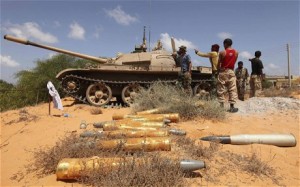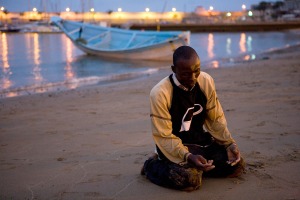
November 12, 2004: Migrants try to climb aboard a Spanish civil guard vessel after their makeshift boat capsized during a rescue operation at sea off the coast of Fuerteventura. Of the 36 in the boat, 29 were rescued (Juan Medina/ Reuters)
Imagine if you will that you live in a gated community within which are seven homes each with its unique culture, environment and endowments. And just like any other community, there are regulations that govern its residents. These range from how the homes are to do business with each other, visit each other, or even change homes. All has been well in this community until children from one home became too frequent visitors in another. While ordinarily visits in this gated community are relatively safe, lately they have been anything but.
Of course by now, dear reader, you are aware that this gated community is none other than earth and the two homes referred to herein are Africa and Europe. The question that looms over these two homes is ‘whose problem is it’?
Europe
So far she has acted in a manner suggesting it is hers. At one time, in an effort to reduce the number of migrants making the perilous journey through the Mediterranean Sea into Europe, she withdrew her Search and Rescue operations. This was unfortunately informed by a perception that the operation acted as a pull factor for the migrants. The result was of course the unprecedented deaths of over 1,200 migrants in two separate disasters in the month of April alone. Since then, the European Union has resumed search and rescue operations.

October 5, 2013: Coffins are laid out in a hangar at Lampedusa airport after a boat packed with migrants sank, killing more than 360 people(Alberto Pizzoli/AFP)
Furthermore, beginning next month, the EU will conduct search and destroy operations against the boat smugglers in Libyan waters. However there are some who think this is an inefficient way of dealing with the problem. A more robust way would be tracking the money made through trafficking, possibly into tax havens in Europe and freezing such accounts.
Adoption of a quota system in resettling the migrants among its member countries has also been considered. As things stand now, out of the twenty two members countries of the EU, only six bear the heaviest burden of immigrants.
Other possible avenues of action have also been floated. It has been suggested (rather obviously) that a stable Libya would be a deterrent to the lucrative trade of human smuggling. However, a stable Libya driven by western influence might be a long shot. This is because it was the West that encouraged the toppling of Muamar Gaddafi thus leaving a leadership vacuum in Libya.

Anti-Gaddafi forces place tanks in position in Om El Khanfousa, east of Sirte, after liberating the area from Gaddafi’s forces Photo: REUTERS/Esam Al-Fetori
It has also been suggested that applications for asylum be processed south of the Mediterranean Sea as opposed to inside Europe as is the case currently. In addition, successful applicants will be hosted by North African countries with the support of the EU while rejected economic refugees will be sent back to their home countries.
Throughout these deliberations, the underlying attitude of Europe towards immigrants has come to the surface. Consider a few presented herein.
‘Africa’s demographic time bomb is its own affair. If they do not have the rule of law, good governance and birth control why should we, who do, have to suffer the consequences? We know that it is an invasion exploiting our gullibility with their ‘rights’. We know that millions will come. We know what it will do to our society. Time to put up the draw bridge. Our ancestors did not fight for our freedoms for this moral weakness because we don’t have the guts to stand up for ourselves as that may be seen as racist to say no to black people due to our pathetic white guilt. I don’t know about future generations as they’ll probably be African not European.’ Reader commenting in The Guardian Newspaper (of course this opinion is not representative of the newspaper)
‘NO, I don’t care. Show me pictures of coffins, show me bodies floating in water, play violins and show me skinny people looking sad. I still don’t care… Make no mistake, these migrants are like cockroaches. They might look a bit “Bob Geldof’s Ethiopia circa 1984”, but they are built to survive a nuclear bomb. They are survivors. It’s time to get Australian. Bring on the gunships, force migrants back to their shores and burn the boats.’ Celebrity Columnist Katie Hopkins writing for The Sun newspaper.
Nonetheless despite such anti-African sentiments, Europe has taken decisive steps to solve its immigration problem. Unfortunately, Africa has yet to wake up to its emigration problem.
Africa
In Africa, it seems that migrants can only find a voice through civil society groups and journalists.
The African Commission on Human and People’s Rights which met in Banjul in early May, said in a statement that it “deplores the silence of African countries” on migrant deaths, calling on the African Union “to end this scourge, and respond to the plight of these people“.
“The silence of African leaders faced with the drama of illegal immigration, with its toll of deaths, is disturbing,” said Amsatou Sow Sidibe, an adviser to Senegalese President Macky Sall.
“Illegal emigration is emptying the continent and the African countries of the means to promote their development,” she told AFP, blaming “widespread poverty and massive unemployment of youth attracted to horizons where they hope, often wrongly, to find the conditions for a more tolerable life“.
The organisation further voiced concern that the deteriorating socio-economic, political and security situation in some countries was “pushing these people to embark on the migratory adventure, risking their lives“.
Perhaps the only thing response we have heard from the African Union is a passing statement from its chairperson during a meet with the EU on 22 nd April this year.
“If people don’t have livelihoods at all, they are not going to sit and die of hunger, they are going to look for greener pastures,” Nkosazana Dlamini-Zuma told reporters in Brussels.
“We don’t have an instant solution but we are going to be looking at and taking steps but we can’t say those steps will solve this thing tomorrow,” she added.
Unfortunately, I cannot recall of any sitting president who has addressed the problem directly except Gambian President Yahya Jammeh. However, his comments add salt to an already open and festering wound.
He acknowledged in an address on state-run television in mid-May that “there were many funerals in the country a few weeks ago because a lot of people died in the Mediterranean”.
But he blamed parents who pay for their children to embark on the risky voyage, suggesting they are not “true Muslims”.
“If these people are true Muslims and really believe in what they are saying, then they should equally believe that their sons and daughters could have made it at home if they were ready to invest and work,” Jammeh said.

July 1, 2008: A man offer prayers of thanks after arriving at a beach on Spain’s Canary island of Gran Canaria(Borja Suarez/Reuters)
Consider the audience to whom President Jammeh directed his message will you? A people subjected to human rights abuses, extra-judicial killings, torture and its journalists constantly muzzled; a people who know poverty first hand- a third of them survive on $1.25 or less a day. Yes, according to president Jammeh, it is their fault that their children perished in the Mediterranean Sea.
So the question still stands, whose problem is it?
My take is this is a European problem as much as it is an African problem. And to solve it, Europe needs to swallow its pride and overcome its fear of the other and Africa needs to gather what little dignity it has left, recognise that those seeking refuge in Europe are not the scum of the earth but a product of poor African governance. It is time Africa hearkened to the cries of her perishing young.
